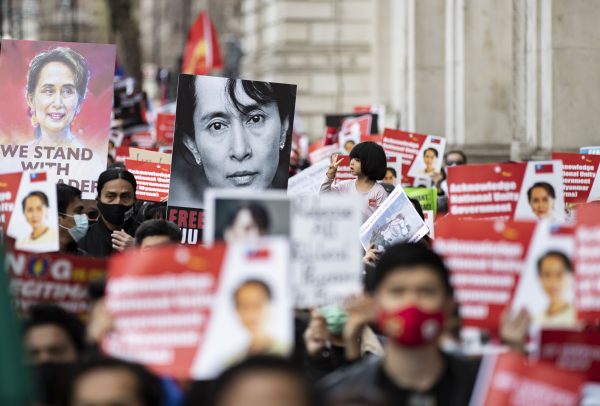As the country moves towards economic collapse, analysts are speculating on the possibilities of a civil war and state failure, prompting comparisons that Myanmar could be facing a humanitarian crisis not unlike Syria’s. While these comparisons do not match the facts on the ground, the situation now facing Myanmar demands a more critical response from the international community.
Given the world’s widespread reluctance for intervention and focus on domestic affairs as a result of COVID-19, many leaders have expressed their hopes that ASEAN might encourage the military to stop the bloodshed, de-escalate tensions and restore ‘democracy’ to the country. But a recent ASEAN Leaders’ Meeting special summit on 24 April that brought military chief Min Aung Hlaing together with ASEAN leaders achieved very little. Considering the region’s democratic backslide towards authoritarianism, pro-democracy activists have been rightly sceptical of the motivations of this group.
ASEAN and other countries, including Australia, continue to emphasise the release of the State Counsellor Aung San Suu Kyi, respect for the 2020 November election results and a return to partial civilian rule. But for many from the pro-democracy camp there is no return to the ‘status quo’ and the military needs to be removed from the negotiating table entirely.
The coup has highlighted the fragile nature of previous power-sharing arrangement and the ultimate control the military had over the country’s leadership and governing institutions. It has also galvanised a generation of young people and workers, which the National League for Democracy (NLD) government mostly ignored. This includes labour unionists fighting for better working conditions, farmers organising around land rights, and ethnic nationality communities seeking peace and inclusion within a genuine federal union.
The question of whether Myanmar has ‘descended’ into civil war ignores the ongoing conflicts that have plagued the country’s ethnic states since independence, including under the NLD administration. Most notably, the NLD oversaw and then defended at the International Court of Justice a violent and genocidal military ‘clearance operation’ which drove more than 740,000 mostly Muslim Rohingya refugees over the border to Bangladesh. Over the last five years, counter-insurgency campaigns against EAOs in Rakhine, Shan and Kachin States have also intensified, displacing tens of thousands of people.
The pro-democracy movement that has emerged out of the coup is fundamentally leaderless and has brought people together across ethnic, religious and generational divides. Spearheaded by young people, ethnic activists and other known critics of the NLD government, the fight against the military has become a battle to rebuild a more united and inclusive Myanmar.
In line with this, the recently-established National Unity Government (NUG) (in exile) — made up mostly of NLD representatives — has committed to working closely with ethnic nationality communities, EAOs and civil society groups. On 31 March, these intentions were materialised by the announcement of a federal democracy charter. The document includes plans to abolish the 2008 Constitution and establish a new Federal Democracy Union, with a high degree of decentralisation and recognition of collective ethnic rights, customs and ownership of resources. Preliminary negotiations are also underway to create a Federal Union Army led by EAOs. And the NUG has taken ownership of past failures, with some leaders openly apologising for their silence over the suffering endured in ethnic states, including that of the Rohingya.
While there are many reasons to be sceptical of the ability of the NUG to fulfil this new political vision, not least because of their unclear position on the Rohingya, the emerging dialogue from the pro-democracy camp gives hope for a way forward for the country to reconcile its past and move beyond the identity-based politics which the military has helped to foster. As highlighted by Burmese activist Mi Mi Aye, ultimately, revolutions are built on hope. But its success will depend heavily on resources, recognition and engagement from the international community.
The current moment presents a significant opportunity for governments like Australia and the aid and development sector to work directly with the NUG to support fundamental rights in a future Myanmar — including those that were ignored under the former government. This means partnering with civil society organisations (CSOs), including ethnic CSOs, and engaging in dialogue about federal democracy and the importance of including groups such as the Rohingya within this vision. CSOs already have the experience and structures in place to support this vision and the people on the ground in concrete ways. It is time for the international community to really listen to those voices and ensure that a return to democracy in Myanmar does not mean a return to the status quo.
Justine Chambers is a Visiting Fellow in the School of Culture, History and Languages at the Australian National University.


The article presents a general historical narrative but is largely detached from the micro-events of oppressive and brutal actions by the Tatmadaw against a vulnerable but determined citizenry who have decided to defend themselves with homemade weapons and generating 800 plus fataities in the process. What appears to be emerging is a broad coalition of non-state agencies which surpass the NLD and to a degree, even the NUG. Currently there is a fluidity in the architecture of configuration of groups opposing the junta which continues as a dynamic work in progress. The movement is breaking out of the Burman heartland which is the comfort zone of the NLD in the spirit of Aung San. The international community will require a diverse platform of interaction and engagement with national counterparts. The history of an armed struggle in the wake of the 1988 uprising does not bode well and lessons may need to be learned from this with a view to a smart opposition designed to implode the cyber-security, economic enterprises and family privileges of the military. Student retaliatory action against family members of the military attending overseas educational establishments should also be on the table.